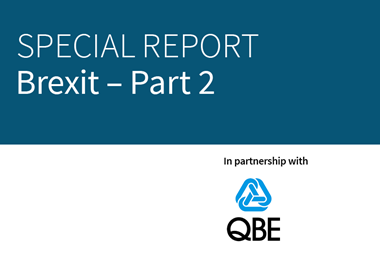Risk managers urged to ‘prepare for a wide range of possible outcomes’

While there is a degree of clarity about some aspects of Brexit, such as retention of the overall prudential framework and certainty of insurance cover, there are many issues which remain difficult to ascertain.
In his keynote speech to risk managers, Richard Pryce, CEO QBE European Operations, said it was fundamental that businesses needed to “understand the full extent of their exposure to the European Union”.
Calling the situation “unprecedented”, Pryce said: “None of us have ever experienced anything like this and one thing which is inevitable is that it will lead to more uncertainty as we go along.”
Nonetheless Pryce said it was important to make sure companies considered carefully their Brexit exposure: “What extra costs will you face, whether in terms of increased tariffs for your exports, higher costs for imported goods and raw materials, tighter restrictions on labour market movements or greater operational friction, such as longer lead times for deliveries and additional licensing requirements?
“To what extent could your supply chain be disrupted by those additional costs or bureaucracy, affecting not just your primary suppliers but their own trading partners?
“How confident will your customers be that you will be able to continue to provide them with the goods and services they seek, with the same costs and convenience as before?”
Earlier, Pryce warned about supply chain exposure not only in terms of goods but also services.
“Over the 40 years in which the UK has been a member of the European Union, British companies have become closely integrated into European supply chains, and European suppliers into ours,” Pryce said.
“Any setback to the free movement of goods that we have come to enjoy over those years could jeopardise the smooth operation of those chains, which depend on the ability to transfer supplies between countries without being held up by customs paperwork and regulatory hurdles.”
Restrictions on the movement of people could prove to be a significant barrier for businesses.
“Many UK industries, from accountancy to agriculture, now rely on large numbers of EU workers in their labour force,” Pryce said.
“There is a widely held assumption that a humane solution will be found whereby those currently living and working in this country will not suddenly be uprooted and forced to return to their countries of origin, through some kind of grandfathering arrangement.
“But particularly for those of you running large, long-term projects, the referendum has injected an extra element of uncertainty into your plans for staffing.”
When all of this was taken together and seen through the prism of the interconnectedness of risk, Pryce said this raised considerable issues for business.
“So when we talk about the future terms on which we will be able to trade with Europe, we are not just talking about extra tariffs levied on British exports, but about a much more complex web of interactions, where a little bit of extra bureaucracy, or an added difficulty in securing the right candidates for your workforce, may in the long run prove to be as damaging as an overt tariff,” he said.
“Not that those additional tariffs are to be underestimated. In the absence of a newly negotiated trading arrangement with the EU, British exports would revert to the common external tariff, sometimes referred to as the World Trade Organisation option. That would, broadly, mean an extra charge averaging 4% on British goods. But for some sectors it would be much stiffer: 10% for cars, for example, and much more than that for food, beverages and tobacco.”
Passporting uncertainty
As a result, Pryce said that it was fundamental for companies to understand fully, wherever possible, where their vulnerabilities lay.
Citing the CBI, Pryce said: “There are some industries with specific issues. In education, for example, large numbers of foreign students may find it harder to access UK universities. Fintech is an area where the UK has taken a significant lead, but businesses in the digital arena could be vulnerable to economic shocks, restrictions on the free movement of labour or future regulatory changes.
“And of course, the financial services industry more broadly is not only one of the UK’s most critical exporting sectors but also one that faces particular uncertainty as we prepare to leave the European Union.”
The issue of passporting was “probably the most important area of uncertainty” from an insurers’ perspective, Pryce said. “In logic, if a UK insurer is regulated in essentially the same way as its European competitor, then there would appear to be no very strong reason why it should not continue to provide the same services to its customers as before.
“The legal basis on which we, and perhaps 200 other British financial services companies, conduct our business in Europe is the automatic recognition we receive in other European countries.”
Passporting was a key point in the negotiations around Britain’s exit from the EU not only for insurers but also “for the financial services industry as a whole” and the overall health of the UK economy.
“We have a £17 billion trade surplus with the EU in services, and financial services account for perhaps a third of total UK exports to the EU,” Pryce said. “However, it is precisely because of the importance of financial services to the UK economy that negotiating a workable arrangement could be so difficult.
“As Sam Woods, the new chief executive of the Prudential Regulation Authority, has noted, it would not be a straightforward decision for the UK to sign up to a set of financial services rules over which it would in future have no influence, given the size of its financial sector and the potential risks to the wider economy.”
Again, negotiations around this were fraught with complexity.
“Existing models, such as the European Economic Area, would preserve a large measure of access to the EU market, but potentially at a cost, both in terms of UK influence over future regulations and conceivably in budget contributions,” Pryce said.
“Recognition of regulatory equivalence would be at the European Commission’s discretion, and could be withdrawn. Certainly, there is no existing example of an EU trade agreement with a third country that includes market access for financial services of anything like the same scope as the passporting regime.”
As with many other Brexit issues, the effects of the outcome would be felt beyond the UK.
“The interest in this does not all lie on one side,” Pryce said.
“Besides the 200 or so British financial services companies passporting into the rest of the European Union, there are also around 700 EU financial services companies relying on passporting for their access to the UK.
“From where I sit, this is an important point, but it is not one where I can sit around forever waiting for a resolution from the Government. Our customers expect us to provide continuity and certainty, they will not want to hang around waiting to hear what the answer is.”
To achieve this meant initiating contingency measures, Pryce said.
“I don’t want to put a deadline on it, but at some point we will have to decide what we are going to do to provide that certainty.
“That might mean setting up a subsidiary somewhere else in the EU, where passporting rights to other European markets would remain secure. That might be somewhere like Belgium, Luxembourg or Malta, but I have said before that the obvious choice would be Dublin.
“A related question concerns London’s role as an insurance centre. Opinions are divided on this. There are those who believe that if another European financial hub emerges, it could cost London business; London could even lose critical mass. Some of the talk on this topic has, however, softened since the vote took place. There is now more talk of company adjustments, and less of wholesale relocations.
“Lloyd’s of London has certainly been alert to the issue, and is clearly prepared to defend its position. It wants to retain European market access for itself and the London Market, and has been in active conversations with both the market and the Government.”




















No comments yet